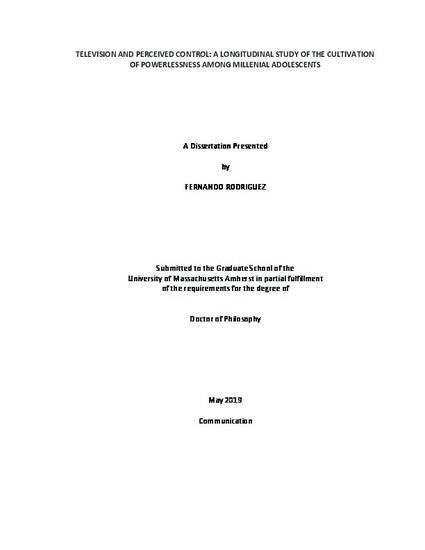
Dissertation
TELEVISION AND PERCEIVED CONTROL: A LONGITUDINAL STUDY OF THE CULTIVATION OF POWERLESSNESS AMONG MILLENIAL ADOLESCENTS
(2019)
Abstract
Cultivation research has observed the long term subtle contribution of television mediated storytelling on the perceptions and beliefs of American viewers for fifty years. Early criticisms of cultivation argued the associations of viewing amount and fear of victimization were spurious and explained away by personality traits such as perceived control or authoritarianism. This project frames perceived control as a cognitive assessment of the personal ability to cope with life challenges. As a cognitive assessment, perceived control is assumed to be in constant revision. From a life-course approach, the symbolic cultural environment (which includes television) is seen as providing context and expectations which shape perceived control evaluations. The contribution of mediated storytelling is expected to have greater impact on times of role transition, for example, during late adolescence in which the individual transitions into adulthood, experiencing challenging new situations and demands.
To test the hypothesis that heavy television viewing contributed negatively to personal evaluations of control during times of transition, a longitudinal study was conducted using data from the National Longitudinal Survey of Youth (NLSY79:Young adults). The data includes 663 adolescents surveyed in 2000 at the age of 14, 15 o 16; and again four years later. Sample includes an oversample of Blacks and Hispanics for comparison purposes. Hierarchical linear regression was employed to test the longitudinal associations. Evidence for cultivation suggest a significant longitudinal contribution of television viewing to perceived control, which supports a resonance pattern.
In this case, resonance refers to a model specification that points to already disempowered and vulnerable social groups (e.g., Minorities, females and those with low educated mothers) reporting lower perceived control when they are heavy viewers. Longitudinal patterns evidence a stronger cultivation effect for females then the cross-sectional analyses, which support the assumption of long term effects from viewing.
Cultivation effects are discussed in terms of worldview distortions. Beyond the distortion of social facts and expectations, which is one of the classic tenets of cultivation research, the current study argues that heavy viewers adopt a worldview with dysfunctional risk evaluations. TV´s worldview seems to rely on an extremely small number of sources for control.
Keywords
- Perceived control,
- Cultivation Theory,
- Longitudinal Panel Survey,
- Pearlin's Mastery,
- Television,
- George Gerbner,
- Millennials
Disciplines
Publication Date
Spring May 10, 2019
Degree
Ph.D.
Field of study
Communication
Department
Department of Communication
Advisors
Michael Morgan
Citation Information
Fernando Rodriguez. "TELEVISION AND PERCEIVED CONTROL: A LONGITUDINAL STUDY OF THE CULTIVATION OF POWERLESSNESS AMONG MILLENIAL ADOLESCENTS" (2019) Available at: http://works.bepress.com/fernando-rodriguez/1/